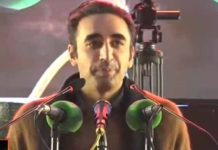RAWALPINDI, JUL 22: Inter-Services Public Relations (ISPR) Director General (DG) Maj-Gen Ahmed Sharif is currently addressing a press conference in Rawalpindi.
“The purpose of this press conference is to clarify the army’s stance on some important topics,” he said, adding that there was some “increase in organised propaganda, false, wrong news and concocted news” against the armed forces in recent times.
“That is why it is important to talk on these matters.”
Providing updates on counter-terrorism operations so far in the year, he said 22,409 intelligence-based operations were conducted against terrorists and their facilitators.
He said over 112 operations were being conducted daily by the military and law enforcement agencies against terrorism.
Responding to a question regarding the potential of displacement in key areas as a result of the government’s new planned operation, Azm-i-Istehkam (Resolve for Stability), DG Ahmed said that it was a “comprehensive counter-terrorism campaign” through national consensus and “not a military operation per se as it is being presented”.
He further said: “I will start by saying that our problem is that we are sacrificing even very important issues on the altar of politics and Azm-i-Istehkam is one such example of this.”
DG Ahmed said that a narrative was built to give the impression that the operation was launched to displace people, clarifying that it was only for the purpose of “reinvigorating the already in-place National Action Plan”.
He said kinetic efforts already under way would be “augmented” by law enforcement agencies empowered by effective legislation, as per the original announcement of the operation.
Referring to the original announcement, the DG ISPR questioned where it pointed to previous military operations.
“Our issue is that we make every important issue … a joke because of our politics,” he reiterated.
The DG ISPR said that a “very strong lobby” did not want the objectives of the National Action Plan to be fulfilled “because the stakes are very high”.
“A massive illegal, political mafia rose to sabotage the operation and the first move of that mafia was to make the operations controversial.”
Pointing to the National Action Plan’s 14 points, he said kinetic operations were “under way in a splendid manner” with “four to five operations under way in every hour”.
He said the problem was present in the plan’s other points. DG Ahmed said it was decided in 2014 and 2021 that Counter-Terrorism Departments would be established at the provincial levels and they would be responsible for leading operations against terrorism.
The DG ISPR said the National Action Plan also talked about the regularisation and registration of religious seminaries but only a bit over 16,000 were and thus the status of 50 per cent was unknown.
“Does the army have to do this?” he questioned.
He said if Operation Azm-i-Istehkam was properly acted on, it would not only eliminate terrorism but also lead to societal and national uplift.
Questioned about the weekend’s violence during a peace rally in Bannu and the alleged firing by security forces, DG Ahmed mentioned last week’s terrorist attack on Bannu Cantonment that martyred eight military personnel.
He said the locals had demanded carrying out a peace march the next day and it was agreed that there would be no anti-state slogans carried out. “But when the peace march began, some specific negative elements joined with it,” he added.
He said the rally marched through the point of the terrorist attack and “chanted slogans against the army and the state and pelted stones”, adding that some armed individuals were already part of the march “who [opened] fire because of which there were injuries”.
DG Ahmed said a temporary wall erected was also torn down and the supply depot was looted.
“This is how it happened. The army’s response was as per SOP (standard operating procedure) and as per orders. When the May 9 incident happened, a specific political group, a chaotic crowd, began doing propaganda that why didn’t the army stop them.”
DG Ahmed said the army’s system was “very clear”, adding that if there was a military situation then there “are very clear [directions] and the officers conducted themselves according to it”.
He said if a “chaotic crowd” set upon a military installation then it was first “given a clear warning”, then aerial firing was carried out and “if it still does not stop then it is treated how it should be.”
DG Ahmed said security forces had thus conducted aerial firing as per the above code.“The issue is why this happened. This happened because your legal and judicial system, when it gives leeway to the perpetrators and facilitators of May 9 and doesn’t bring them to justice then discord, mob mentality and fascism will further increase in the country.”
The DG ISPR said riot control and law and order were the province government’s responsibility and not the military’s. “Miscreants join a crowd and open fire and kill people, so this responsibility is of the provincial government and administration. So it does not make sense that what protest is one political party carrying out against its own provincial government?”
DG Ahmed said protests should definitely take place and the nation had a right to express its anger at terrorist incidents. Questioned about an alleged audio leak of Mufti Noor Wali Mehsud, chief of the outlawed Tehreek-i-Taliban Pakistan group, the DG ISPR questioned what brand of Islam the militant was preaching that talking about blowing up schools, colleges, hospitals and homes.
“This will be taken to its logical end,” he said, adding that such things “only strengthen our resolve that Azm-i-Istehkam is highly necessary”. Questioned about the recent sit-in by the Tehreek-i-Labbaik Pakistan, he said the issue at its core was about Palestine. “This is a very important and sensitive issue. It should be clear that the state and army have a clear stance on the issue of Palestine: it is genocide and unacceptable.”
He said Pakistan had sent over 1,100 tonnes of aid to Palestine.

















